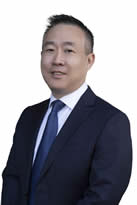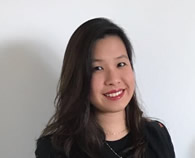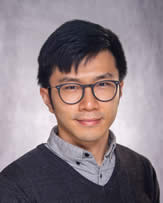New Faculty Profiles
Welcome...
Alex K. Wong, MD
Tania Wong, PhD
Lok-Yin Roy Wong, PhD
Chun-Chieh (Jack) Hsu, PhD

Dr. Alex Wong graduated cum laude in Biological Sciences from Cornell University and received his M.D. from Harvard Medical School. As a medical student he was awarded a Howard Hughes Medical Institute Pre-doctoral Fellowship to study angiogenesis and cancer biology at Dana Farber Cancer Institute. Dr. Wong pursued post-doctoral clinical training in Plastic Surgery at the University of Pittsburgh Medical Center and post-doctoral basic research fellowship training in progenitor cell biology at Memorial Sloan-Kettering Cancer Center. Prior to starting his first faculty position, Dr. Wong completed additional sub-specialty clinical fellowship training in Reconstructive Microsurgery at NYU Langone Medical Center.
Dr. Wong started his research laboratory in 2010 at the Keck School of Medicine of University of Southern California and was most recently at the Beckman Research Institute of City of Hope. His group has had a longstanding interest in studying fundamental aspects of tissue regeneration as it relates to lymphangiogenesis and wound healing. Over the past decade, Dr. Wong's group has received extramural support from numerous agencies including the National Institutes of Health (K08 & R01), Plastic Surgery Foundation, California Institute for Regenerative Medicine, and Lymphatic Education & Research Network. Dr. Wong will be joining Rutgers New Jersey Medical School as Professor & Vice Chair of Research in the Department of Surgery and Member of the Center for Immunity and Inflammation in April 2024.

Dr. Wong obtained her PhD from the University of Melbourne, Australia. There, she focused on effector proteins that are secreted by gastrointestinal pathogens and how they interfere with host cell signaling pathways involved in inflammation and cell death to establish infection. Following the completion of her PhD in 2016, she joined the laboratory of Professor Alice Prince at Columbia University where she continued to investigate the interaction between the host and bacterial pathogens, particularly those that are multidrug-resistant. She has gained experience with various mouse models of pulmonary and skin infection. A major focus of her research, for which she was awarded a K99/R00 grant from the National Heart, Lung, and Blood Institute (NHLBI), is the host-pathogen metabolic interplay, which shapes the infection outcome. She is interested in understanding how opportunistic pathogens such as Klebsiella pneumoniae and Staphylococcus aureus subvert the host metabolic response and how this in turn dictates the immune response. In addition, she aims to manipulate the immunometabolic response to promote bacterial clearance via dietary intervention and changes in the microbiota.
Dr. Wong will join the Center for Immunity and Inflammation (CII) at Rutgers NJMS as an Assistant Professor and Chancellor Scholar in the Department of Microbiology, Biochemistry & Molecular Genetics in April 2024.

Dr. Wong received his PhD at the University of Hong Kong where he studied the role of coronavirus proteins in perturbing innate immune responses. He then moved to Iowa and joined Dr. Stanley Perlman's lab for his postdoctoral training and research on coronavirus pathogenesis. During his postdoctoral training, Dr. Wong studied and characterized the Spike mutations found in human and camel MERS-CoV isolates in relation to pathogenesis. At the time of the COVID-19 pandemic, Dr. Wong was involved in developing several mouse models for SARS-CoV-2 infection that have been widely used by the scientific community. He also isolated a mouse-adapted strain of SARS-CoV-2 that causes severe disease in mice as a pathogenic model for COVID-19 for studying SARS-CoV-2 pathogenesis and vaccine and antiviral development.
Dr. Wong will join the Center for Virus-Host-Innate Immunity (CVHII) at Rutgers NJMS as an Assistant Professor and Chancellor Scholar in the Department of Microbiology, Biochemistry and Molecular Genetics in the Fall of 2023. The Wong lab's research focus on coronavirus pathogenesis will be addressed by understanding 1. CoV protein functions in relation to pathogenesis; 2. Immunopathogenesis caused by CoV infection; 3. Development of animal models for studying CoV pathogenesis. The lab uses various virology and immunology approaches to investigate virus- and immune (host)-mediated pathogenesis in various model systems.

Dr. Hsu received his BS and MS from National Taiwan University. He attended Duke University for his PhD, where he worked in Christopher Nicchitta’s laboratory to discover and characterize translational regulation and RNA localization in eukaryotic cells. His postdoctoral research was at Yale University in Peter Cresswell’s laboratory, where he sought to apply his molecular biology training to investigate virus-host interactions in viral infection and in the innate antiviral response.
Dr. Hsu will join the Center for Virus-Host-Innate Immunity (CVHII) at Rutgers-NJMS as an Assistant Professor in the Department of Medicine in the Fall of 2023. His research focuses on the functions and regulations of RNA translation and RNA modifications in health and disease. The Hsu lab primarily focuses on understanding the molecular arms race between virus and host in two major research directions: 1) how viruses subvert host translation to hijack the host translation machinery for viral protein production, and 2) how type I interferon induces an antiviral state in host cells to restrict viral replication. The overarching goal of the Hsu lab is to contribute to a greater understanding of how virus-host interactions enhance or prevent diseases.
.

